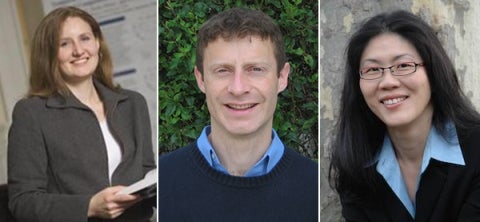Note: Yale School of the Environment (YSE) was formerly known as the Yale School of Forestry & Environmental Studies (F&ES). News articles and events posted prior to July 1, 2020 refer to the School's name at that time.
 Michelle Bell, Mark Bradford, and Karen Seto
Michelle Bell, Mark Bradford, and Karen Seto
Clarivate Analytics, a company that collects data on scientific and academic research, produces an annual list of “Highly Cited Researchers,” identifying scientists who have demonstrated significant influence through publication of papers over a decade-long period. This year, three faculty members from the Yale School of Forestry & Environmental Studies (F&ES) were included.
Professors Michelle Bell, Mark Bradford, and Karen Seto were among 6,000 researchers worldwide named to the list — Bradford roughly one of 4,000 with a specific research field, and Bell and Seto two of roughly 2,000 with cross-field research, a new category that was added to recognize the importance of cross-disciplinary research. The methodology for the list surveys papers published from 2006-2016 that were ranked in the top 1 percent of total citations in their field.
Bell, the Mary E. Pinchot Professor of Environmental Health, is a leading researcher in how atmospheric systems, such as air pollution and weather, affect human health. She further researches the health consequences of climate change and environmental justice. In addition to being a faculty member at FES, she has secondary appointments at the Yale School of Public Health and the Yale School of Engineering and Applied Science.
Seto, the Frederick C. Hixon Professor of Geography and Urbanization Science, is an expert on how urbanization will affect our planet, integrating remote sensing, modeling methods, and field interviews to study urbanization and land change, forecast urban growth, and examine environmental consequences of urban expansion. She specializes in contemporary urbanization in Asia, especially China and India.
A professor of soils and ecosystem ecology, Bradford’s research focuses on the health, biology, ecology, and carbon storage potential of forest, grassland, and agricultural soils. His work seeks to understand impacts at two scales: (1) the role of soils in the global carbon cycle, especially whether interactions between climate warming and soil carbon could lead to runaway greenhouse warming; and (2) how, at local scales, building soil carbon translates to ecosystem services, such as greater food production —but without the need for additional inorganic fertilizers or irrigation.
More than 30 faculty researchers from across Yale and its graduate and professional programs were named to the list.
Professors Michelle Bell, Mark Bradford, and Karen Seto were among 6,000 researchers worldwide named to the list — Bradford roughly one of 4,000 with a specific research field, and Bell and Seto two of roughly 2,000 with cross-field research, a new category that was added to recognize the importance of cross-disciplinary research. The methodology for the list surveys papers published from 2006-2016 that were ranked in the top 1 percent of total citations in their field.
Bell, the Mary E. Pinchot Professor of Environmental Health, is a leading researcher in how atmospheric systems, such as air pollution and weather, affect human health. She further researches the health consequences of climate change and environmental justice. In addition to being a faculty member at FES, she has secondary appointments at the Yale School of Public Health and the Yale School of Engineering and Applied Science.
Seto, the Frederick C. Hixon Professor of Geography and Urbanization Science, is an expert on how urbanization will affect our planet, integrating remote sensing, modeling methods, and field interviews to study urbanization and land change, forecast urban growth, and examine environmental consequences of urban expansion. She specializes in contemporary urbanization in Asia, especially China and India.
A professor of soils and ecosystem ecology, Bradford’s research focuses on the health, biology, ecology, and carbon storage potential of forest, grassland, and agricultural soils. His work seeks to understand impacts at two scales: (1) the role of soils in the global carbon cycle, especially whether interactions between climate warming and soil carbon could lead to runaway greenhouse warming; and (2) how, at local scales, building soil carbon translates to ecosystem services, such as greater food production —but without the need for additional inorganic fertilizers or irrigation.
More than 30 faculty researchers from across Yale and its graduate and professional programs were named to the list.
– Josh Anusewicz joshua.anusewicz@yale.edu 203 436-8994
Published
December 4, 2018